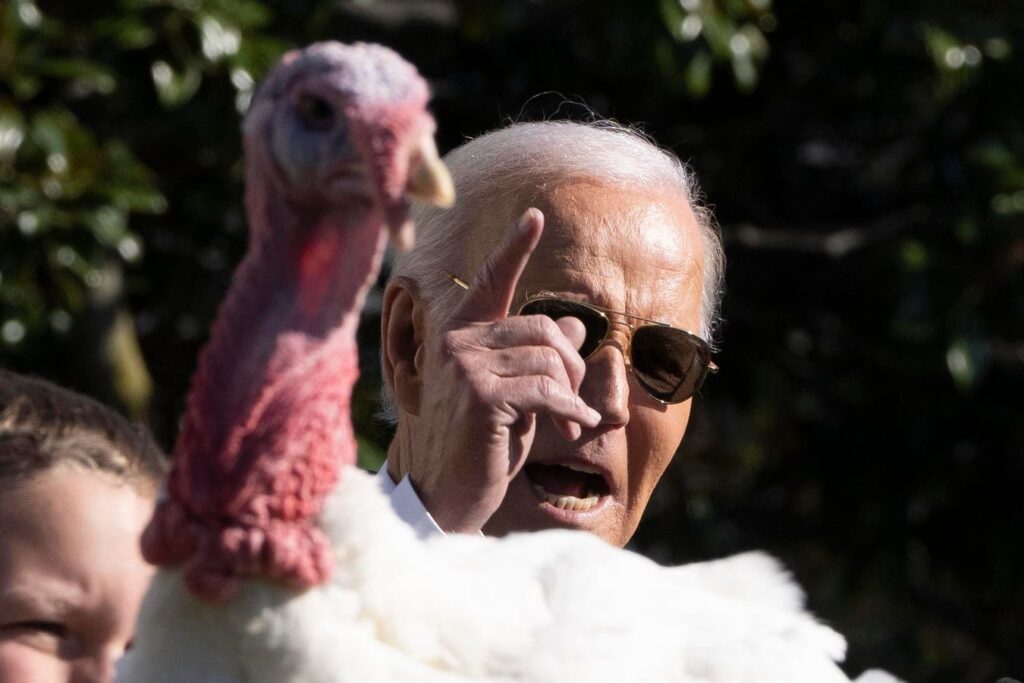President Joe Biden recently made headlines with his decision to pardon Peach, one of the traditional Thanksgiving turkeys, during a White House ceremony on November 25, 2024. However, the more contentious aspect of his pardon decisions involved his son, Hunter Biden, who faced serious federal charges. The presidential pardon shields Hunter from prison time as it effectively nullifies the anticipated sentencing hearings for his cases. This announcement has generated significant backlash from critics who feel Biden contradicted earlier promises regarding pardoning his son, arguing that his action appears to condone his son’s alleged misconduct while framing it as a politically motivated prosecution.
In the broader context of national pardons, the Biden administration’s actions reflect a historical trend dating back to past presidents who have used their clemency powers as a tool for healing and reconciliation. For example, President Andrew Johnson’s amnesty proclamation to former Confederates aimed to mend the nation post-Civil War. Nonetheless, the effectiveness of pardons can often be debated; they tend to serve as mere credits for those who have served long sentences, given after individuals have already faced significant penalties. The current political climate has reopened discussions about reforming the justice system and making the pardon process more transparent and equitable—for both those wrongfully prosecuted and those who have excessively served their time.
Biden’s future actions may also look toward addressing the plight of nearly 1,500 inmates currently on home confinement due to the CARES Act. The pandemic prompted significant shifts in how incarceration was managed, leading to successful outcomes where individuals who were released complied with their community-based sentences without incident. Many of these individuals now face the anxiety of potentially returning to prison. A broader pardon program that includes these cases could not only eliminate the looming threat of re-incarceration but also alleviate the pressures on halfway houses that monitor these individuals, potentially allowing more people to transition successfully back to society.
The contrasting approach by former President Donald Trump also highlights the ongoing debate surrounding pardons and their implications. Trump has expressed intentions to pardon many individuals associated with the January 6 Capitol disturbance, a move that can be perceived as politically motivated. Historically, pardons tend to favor those who have completed their sentences, as in the instance of Hunter Biden’s case. Trump’s plans for pardons not only signify a continuation of his support for those he believes were unjustly prosecuted but also reflect his habits of reshaping norms within the executive branch, potentially influencing how broader issues of justice and law enforcement practices are viewed in his administration.
The structure and operation of the Pardon Office, led by Pardon Attorney Elizabeth G. Oyer, are crucial to understanding the formalities involved in the clemency process. The office evaluates pardon applications and prepares relevant documents for the president’s review. While the office traditionally operates in a non-partisan manner, its processes came under scrutiny during the Obama era when clemency was actively encouraged. Given the politically sensitive nature of Hunter Biden’s pardon, it is unclear how or if the Pardon Office engaged in assessing his case. Additionally, Biden’s expressed desire to address marijuana-related offenses in terms of pardons has so far not translated into significant action.
Shifting demographics of pardons during Biden’s presidency compared to those under Trump and Obama reflects different trends and priorities regarding executive clemency. As of early December 2024, Biden’s administration had granted 26 pardons and 135 commutations, considerably fewer than his predecessors during similar periods. To counteract the criticism surrounding Hunter Biden’s pardon, Biden could broaden his clemency approach to encompass a wider variety of cases that exemplify fairness and justice. Likewise, Trump’s anticipated pardons can serve as a gauge of his administration’s stance toward justice reform, particularly if the pardons focus on addressing inappropriate punitive measures against specific groups.
As both presidents navigate the complex landscape of pardons and criminal justice reform, they possess the ability to redefine how the Department of Justice prosecutes cases and grants clemency. Each has the opportunity to use pardons as a means to address perceived injustices in the legal system. In a society that continues to grapple with issues of fairness and retribution, the power to grant pardons represents a chance to promote empathy and compassion. As articulated by Toni Morrison, those in positions of power must also seek to empower others, highlighting the potential impact of clemency on individuals’ lives and the path toward second chances for those who have erred.

